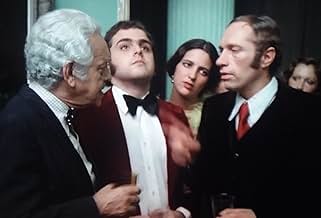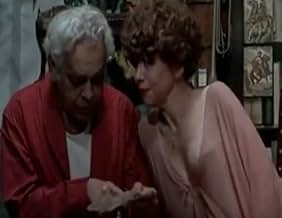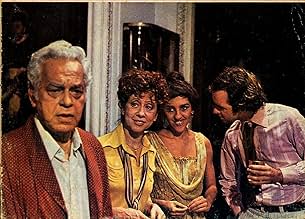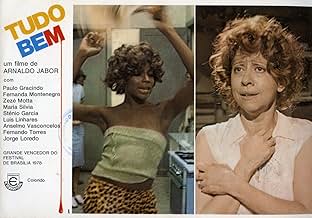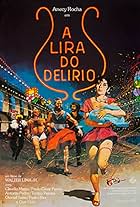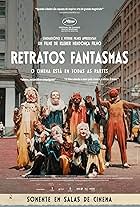Middle-class family reform their apartment, and the noise, the contact with the workers and strange occurrences turn what was supposed to be a trivial matter into a trip to hell.Middle-class family reform their apartment, and the noise, the contact with the workers and strange occurrences turn what was supposed to be a trivial matter into a trip to hell.Middle-class family reform their apartment, and the noise, the contact with the workers and strange occurrences turn what was supposed to be a trivial matter into a trip to hell.
- Awards
- 4 wins & 1 nomination
Zezé Motta
- Zezé
- (as Zezé Mota)
Luiz Linhares
- Pedro Penteado
- (as Luis Linhares)
Paulo César Peréio
- Bill Thompson
- (as Paulo Cesar Pereio)
- Director
- Writers
- All cast & crew
- Production, box office & more at IMDbPro
Storyline
Did you know
- TriviaFilm debut of Anselmo Vasconcelos.
- ConnectionsReferenced in Redentor (2004)
- SoundtracksMúsica do Alto Xingu
Courtesy of Phonogram
Featured review
Juarez Barata (Paulo Gracindo) and his wife Elvira (Fernanda Montenegro), a middle-class, middle-aged couple from Rio de Janeiro, decide to renovate their Copacabana apartment and chaos is installed. Through a series of vignettes, director/co-writer Arnaldo Jabor exposes -- with explosive humor and sharp criticism -- the social, political and cultural differences that separate (but not quite) Brazilian social classes in this operatic, frantic, Carnival-like film that is a rarity among Brazilian comedies: it's not slapstick, it's not vulgar (though it has its share of scatological jokes), it's witty and it's hilarious -- you laugh while keeping your brain working. Who can ask for anything more?
Jabor aims his machine-gun at various issues: fascism, capitalism, imperialism, mysticism, chauvinism, racism, the bourgeoisie, the military regime, the mixed-up relations among social classes in Brazil, etc -- and it's sad to realize they haven't dated at all. There's really no proper plot: the renovation is just a pretext to get the characters together, tease them and start the cockfight. Jabor -- who abandoned his successful film career altogether in 1990 and has since used his bombastic, independent, incisively ironic style to become one of the top Brazilian political/cultural press/TV columnists -- -- manages to combine in "Tudo Bem" a piercing analysis of Brazilian politics and society with his flair for good dialog and interesting musical choices on the soundtrack (including Juarez's fixation on Brazilian birdsong records - "Ah, o uirapuru!!!").
The film benefits immensely from a great cast: veteran Gracindo gives a tour-de-force performance (probably his best on film), alternating a respectable façade when he's sober with nostalgic bravura when he's drunk, at once funny and pathetic; Montenegro (Oscar-nominee for "Central do Brasil") shines as the hysterical Elvira with her inimitable vocal delivery and on-target comic tempo; Luiz Linhares, Fernando Torres and especially Jorge Loredo make a terrific trio of ghosts; Stenio Garcia, José Dumont and Anselmo Vasconcellos have a ball as the workers; Zezé Motta gets to show her callipygian nudity, fascinating energy and fine singing voice. Then-beginners Regina Casé (in her film debut) and Luiz Fernando Guimarães (his 2nd film) sometimes fall back to stage tricks, but they already knew how to strut their stuff and it's nice to see them so young and thin!
Allegoric, loud, intelligent, funny, fast and furious, "Tudo Bem" got a DVD release with so-so quality (they could have remixed the sound: some dialogs get lost under loud music or the workmen's whamming and pounding), but it's one of the best Brazilian comedies of the 1970s and one of Jabor's best -- only the ending is rather flat and disappointing (and Paulo César Pereio hamming it up doesn't help). My vote: 8 out of 10.
Jabor aims his machine-gun at various issues: fascism, capitalism, imperialism, mysticism, chauvinism, racism, the bourgeoisie, the military regime, the mixed-up relations among social classes in Brazil, etc -- and it's sad to realize they haven't dated at all. There's really no proper plot: the renovation is just a pretext to get the characters together, tease them and start the cockfight. Jabor -- who abandoned his successful film career altogether in 1990 and has since used his bombastic, independent, incisively ironic style to become one of the top Brazilian political/cultural press/TV columnists -- -- manages to combine in "Tudo Bem" a piercing analysis of Brazilian politics and society with his flair for good dialog and interesting musical choices on the soundtrack (including Juarez's fixation on Brazilian birdsong records - "Ah, o uirapuru!!!").
The film benefits immensely from a great cast: veteran Gracindo gives a tour-de-force performance (probably his best on film), alternating a respectable façade when he's sober with nostalgic bravura when he's drunk, at once funny and pathetic; Montenegro (Oscar-nominee for "Central do Brasil") shines as the hysterical Elvira with her inimitable vocal delivery and on-target comic tempo; Luiz Linhares, Fernando Torres and especially Jorge Loredo make a terrific trio of ghosts; Stenio Garcia, José Dumont and Anselmo Vasconcellos have a ball as the workers; Zezé Motta gets to show her callipygian nudity, fascinating energy and fine singing voice. Then-beginners Regina Casé (in her film debut) and Luiz Fernando Guimarães (his 2nd film) sometimes fall back to stage tricks, but they already knew how to strut their stuff and it's nice to see them so young and thin!
Allegoric, loud, intelligent, funny, fast and furious, "Tudo Bem" got a DVD release with so-so quality (they could have remixed the sound: some dialogs get lost under loud music or the workmen's whamming and pounding), but it's one of the best Brazilian comedies of the 1970s and one of Jabor's best -- only the ending is rather flat and disappointing (and Paulo César Pereio hamming it up doesn't help). My vote: 8 out of 10.
Details
- Release date
- Country of origin
- Language
- Also known as
- Everything's Alright
- Filming locations
- Production companies
- See more company credits at IMDbPro
- Runtime1 hour 51 minutes
- Color
Contribute to this page
Suggest an edit or add missing content


